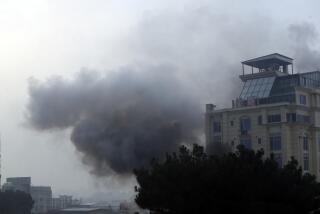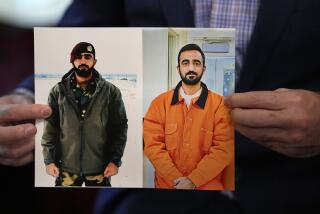Afghan Detainee Maintains His Innocence, as Many Do Before the U.S. Review Board
- Share via
GUANTANAMO BAY, Cuba — The detainee’s lips moved in silent prayer and his hands, grasping notes written in his native Pashto, trembled.
It was the second time that the prisoner, who says he is a country pharmacist, not a terrorist, had appeared before an annual Administrative Review Board. The three-member panel of retired military officers is charged with deciding which of the approximately 450 detainees at Guantanamo must stay -- deemed either to be a threat or to possess information useful to the U.S. in the war on terrorism -- and which will be sent home or transferred into foreign custody.
The hearing last week for the Afghan, who can’t be identified under Pentagon rules governing enemy combatants, spotlighted the difficulties of separating truth from fiction about Guantanamo’s prisoners. The Bush administration has described them as being among the world’s most dangerous men, but many profess to be simple villagers captured in the chaotic aftermath of Sept. 11.
Like the majority being held here, the 60-year-old Afghan has not been charged with any war crime. So his detention was unaffected by the Supreme Court ruling that struck down the tribunal system used for those who do face formal charges. Congress, however, is looking at passing legislation to mandate the procedures for dealing with the foreign captives.
“There has not been an attack on the U.S. mainland since 9/11,” Guantanamo’s intelligence chief, Paul B. Rester, said in justifying the detention of prisoners without charges. In weighing national security concerns against foreign prisoners’ rights, he said, the Pentagon has erred on the side of protecting the U.S. because “no one wanted to be the person to allow the next 9/11 to happen.”
The future of detention operations here has been clouded by international condemnation and the suicides last month of three prisoners. Still, the short-term outlook for men such as the bearded Afghan seems to be more time inside the fences and razor wire of the camps set among cactus groves on this Caribbean island.
Wearing an orange tunic, tan pants and black flip-flops, the prisoner sat through the nearly three-hour proceeding in leg irons, a connecting chain looped through a metal ring in the floor of the air-conditioned trailer.
The men conducting his review -- a retired Marine colonel, Air Force lieutenant colonel and Air Force major -- listened to the government’s case for continued detention of the prisoner arrested near Zormat, Afghanistan, in late 2002.
Among their arguments was an allegation that the man’s brother was a senior fighter for the Taliban. The detainee also was said to have taken up arms against Soviet troops during Moscow’s decade-long occupation of his homeland.
After swearing an oath to God, the pudgy Afghan with a bushy salt-and-pepper beard responded: “I’ve spent three years in this jail and, during that three years, they keep saying my brother was a commander in the Taliban. And I keep telling them, no, he wasn’t.”
He rebutted each claim against him and said he supported the interim government headed by Hamid Karzai, a fellow Pushtun, who took office after the Taliban was driven from power by the U.S. invasion of Afghanistan. Karzai later became president.
Faced with accusations that he harbored weapons and liberated Taliban and Al Qaeda figures during his brief tenure as a county government official in 2002, the Afghan cast himself as a humble family man and public servant who had good relations with two Americans in his town -- whom he knew only as Mike and Tony.
“If you can prove I have even one day worked for the Taliban, you can keep me here for 10 years,” the prisoner said.
According to the review process, the Afghan detainee was not shown any evidence the government may have against him, nor did he have the right to know who had accused him.
Rester said detainees often proclaim innocence at the annual reviews in hopes of getting the panel to believe they would pose no security threat if released or transferred.
The determination made as a result of the hearing will be weeks or months in coming. The panel members first must report their recommendation for release, transfer or continued detention to other Pentagon agencies for consideration, said retired Navy Capt. Frank Sweigart, director of the Office for the Administrative Review of the Detention of Enemy Combatants.
At the end of that process, the outcome will not be made public.
More to Read
Sign up for Essential California
The most important California stories and recommendations in your inbox every morning.
You may occasionally receive promotional content from the Los Angeles Times.











